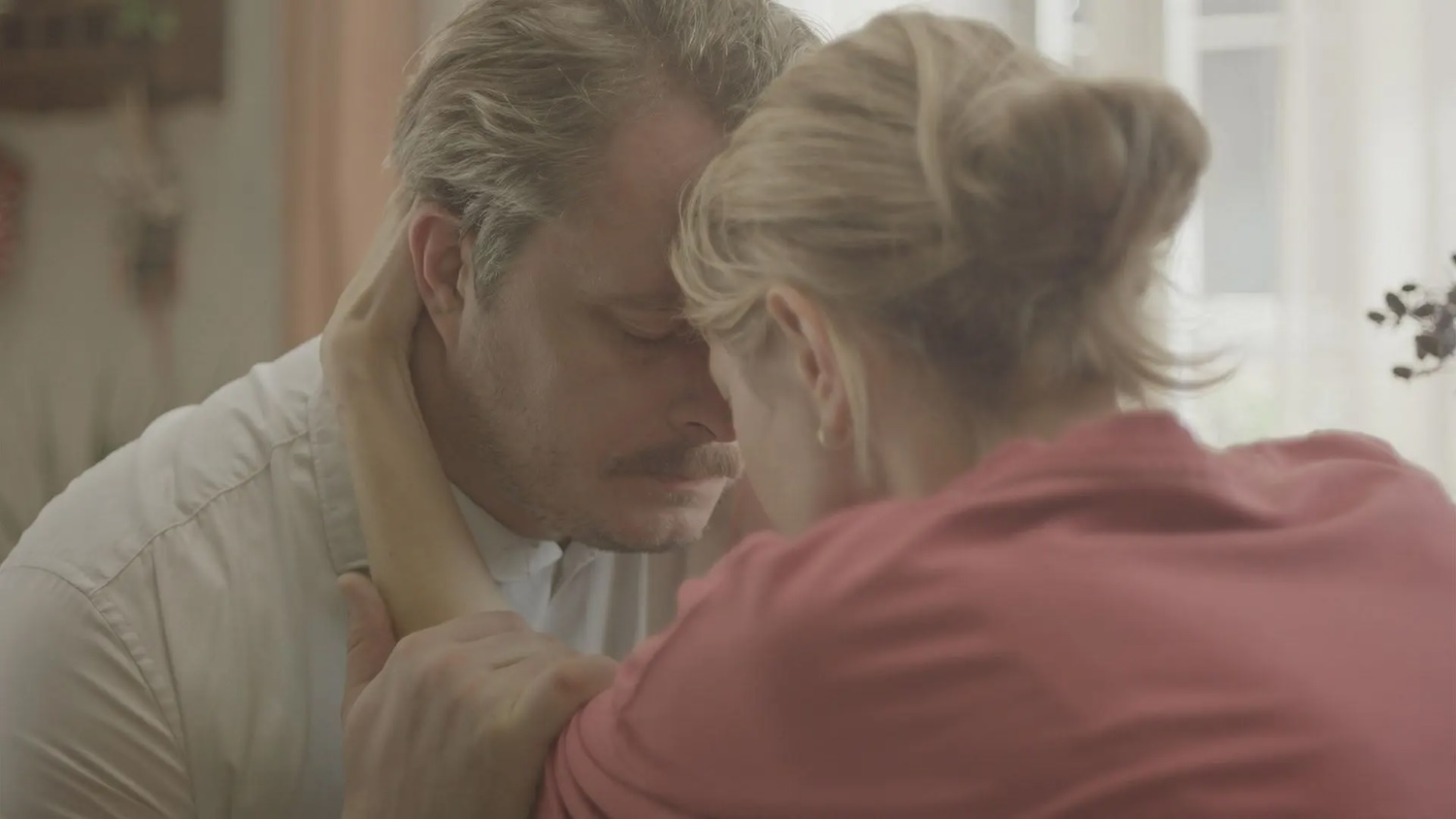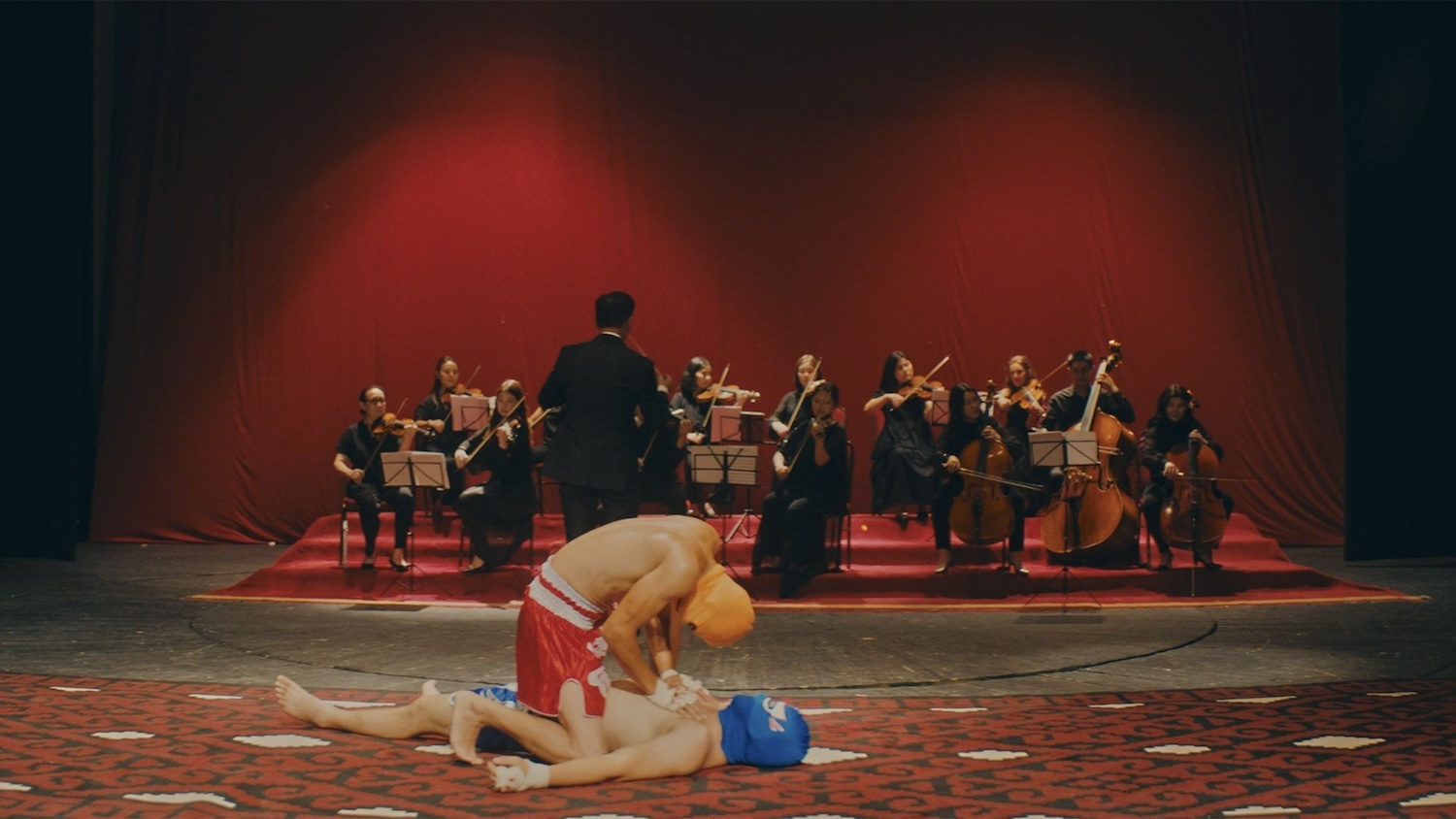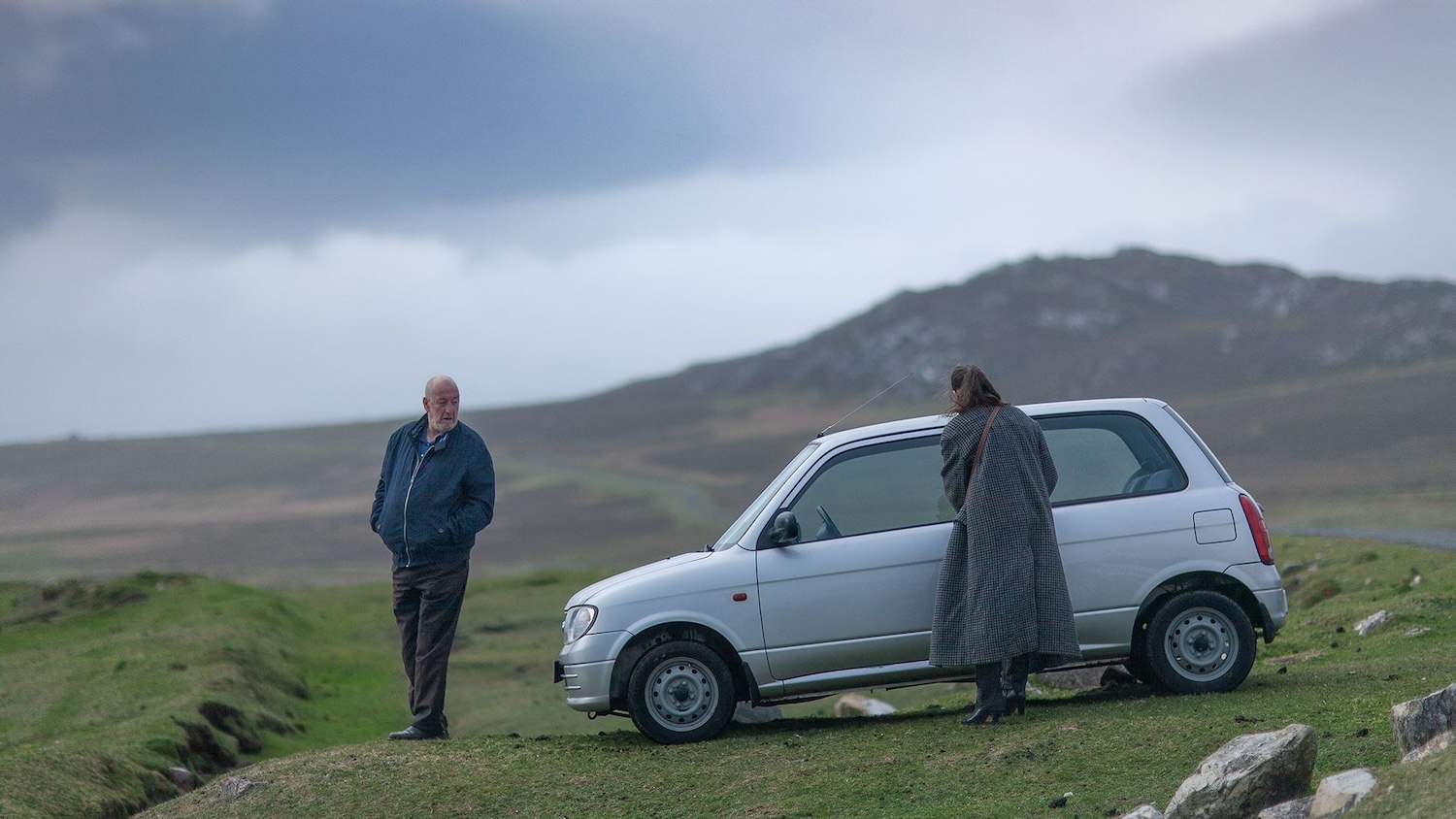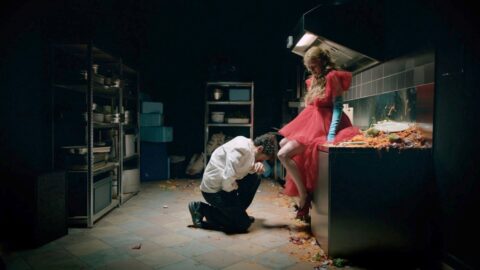I didn’t enter Tallinn in the best frame of mind.
A life-altering house move, followed by a string of consequential faux pas, combined with a mass erasure of serotonin, had left me on the slightly darker side of feeling not too good. I couldn’t even pursue my favourite remedial activity: pity-wallowing.
I cast off very early morning — at that hour, London is a dim bruise — and while my stopover in Riga afforded me a glimpse of sunlight, I arrived in the Estonian capital as nightfall had accumulated like a thick blanket, exerting a downward pressure that smothered me in sullenness.

Is It Happening?
Time for some movies. On recommendation, I ventured out of my fugue state to see First Feature entry This Is Not Happening (Artur Wyrzykowski, all films in this article are from 2025), whose title, it’s fair to say, summed up the prevailing mood. Its visceral, stop-the-clock intensity exposed my feebleness to the fundamental components of cinema, light and sound, and I left the screening in acute sensory dismay. A three-hander that insists on its own dramatic propulsion — forward, forward — the film stages a twitchy dynamic between a father, son and the father’s girlfriend, barricaded in a flat while the police encircle them. Its main visual language is the chronological gradation from bleached white to impenetrable gloom, while its sonic lexis comprises ear-shrilling phone vibrations and emergency sirens. Through these techniques, Polish filmmaker Wyrzykowski conjures up an impressive technical architecture, undermined by a fatal weakness for characterisation.
The son (Borys Otawa, a doe-eyed sociopath) is the presumed assailant. The father (Tomasz Schuchardt, a dissolving pastry) is the high-powered “crisis manager” whose previous indiscretions — he used to get pissed — mean that he will do anything to get the boy out of his newest-fangled pickle. Mediating, intervening and simply being there is Dad’s new squeeze (Paulina Gałązka, a perplexed spectator), on whom the audience projects its horror as the situation disintegrates. We’re invited to track the descent of both men, how their shared misery deepens like a coastal shelf and to reflect that one is much like the other. Where the film succeeds is in shifting the focalisation towards the female interloper, a rival for the patriarch’s affections, and whose voice-of-reason morality and soundless glowering bring into relief the macho tête-à-têtes, often shot in confrontational but nonetheless tactile close-up.
It might be uncharitable to focus on character for what is pitched as a whirlwind thriller, but that identification is crucial for grasping the stakes. The narrative rests on the question of why. Why did the son commit such a heinous act? The resolution to which fuses together the male antagonists through a glib thesis on toxic masculinity. Otherwise, its spatial sense is logically predetermined: a hermetic apartment serves as the zone of inner conflict, contrasting the tranquil and translucent image of a leafy park that opens proceedings. Yet the strange mix of abstract and literal temporalities delivers a jarring effect of stasis throughout. Demonstrative transitions between light and dark are intercut with overt glances to watches and mobiles, on which the camera lingers: “18.38” and such-like. These indicators are supposed to give an awareness of real time, but they overburden the aesthetic design and psychological perspective. That said, this is a tidy exercise in genre filmmaking made on a small budget and 16-day shooting schedule.

Kindly Kyrgyz Kino
I awake the next day a smidge more resilient, and I’ll need to be, because the breakfast entrée is a clinical dose of Backstage Madness, an exuberant first feature from Kyrgyz director Amanbek Azhymat. It’s about a 70-year-old screenwriter, whose teeming imagination must agitate against the commercial needs of his nephew, who runs a bottom-line production company. The film serves as both satire and critique of the wider industry, and how specifically the creative act navigates audience apathy and competing impractical interests. Punters only want “crime stories,” after all, and the theme of mafia corruption throws implicit comment on the world of cinema and its discontents.
This three-part anthology, traversing the codes of gangster, action and romance, is bracketed by scenes with our elderly scribe, wedded to a typewriter (of course) and decreeing his artistic philosophy in ruminative voiceover. Willing, unpaid cast members are drawn from staff, relatives and friends mingling around the nephew’s office. They become repertory players who reappear in several guises across the tales, and there is a fluid, reflexive bent to the narrative that is carefully maintained amid the grotesque exaggerations of its overlapping fictions. Mostly dialled into the register of absurdist comedy, the film risks plenty of goodwill in its dogmatic appeal to kooky slapstick and puerile incident. One such moment has a particularly willowy rubber dildo plummet onto an unsuspecting forehead, interspersed with scenes that tend to gratuitous blood-splattering and regular bollock-squishing. The stories all concern power and violence, but by foregrounding the travails of the artiste in their gestation and development, it turns out to be quite sweet in places.

Bildungswoman
Less sweet and more troubling is Hille Norden’s First Feature entry and Jury Award winner Easy Girl (feature), a German production that offers a sharp, equivocal examination of sexual mores. It follows Nore (Dana Herfurth), a flamboyant, intimacy-prolific 24-year-old urbanite who moves in with her school-age compatriot, the softer, inexperienced Jonna (Luna Jordan). The more self-possessed of the duo navigates one conquest after another, while her fledgling accomplice quickly settles down with a sensitive 30ish guy (Jakob Gessner), who has his own historical burden and scars to bear. To mention scars is no accident, and Norden’s framing (assisted by Bine Jankowski, DP) is especially attentive to flesh, limbs, organs, wounds, cuts and bruises. These gestures constitute the film’s chief metaphorical vernacular, so that harsh, inward turmoil is frequently etched onto human surfaces. This documentation of anguish as embodied suffering is forcefully acted and directed, charting the fluctuations of its central relationships by embroiling the fantasy of bacchanalian excess with the inevitable comedown.
In one illusory sequence, Nore’s edifice literally crumbles to reveal the childhood experiences that underpin her cultivated persona: the inability to say no, the desire to reclaim agency, the elision of paternal and erotic demands, the desperation to be loved, and loved right. The lurid visuals that accompany her carnal exploits — she’s an amateur dressmaker, whose entrance is decorated in a striking flamingo one-piece — give way to something spare and unadorned, a portrait of memories that transparently depict her treatment at the hands of various compromised men. The film eschews simple answers to questions of consent and culpability, although it rigorously outlines a taxonomy of abuse and its consequences. My only quibble is how it redeploys the trope of bildungsroman resolution at its close — a glance at us, the viewer — which neatens up an otherwise messy and painful account of how we process trauma, and why.

Film, Memory
“There is a place where our vanished days secretly gather. The name of that place is Memory.”
One of its most successful devices — flashbacks that counterintuitively mismatch characters as they appear now with how they did then — is used abundantly and less successfully in Sunday Ninth, a Belgian submission helmed by first-time feature director Kat Steppe. It concerns a couple of warring, long-estranged brothers who engage in scuffles and fisticuffs, with one sliding into incomprehension as the other tries to exploit it. Here, the role of recollection is even more thematically pronounced. The above John O’Donohue quote prefaces a sustained depiction of Alzheimer’s in a specialist home in Antwerp. What is so striking is how the film fuses a dramatic, often comical, narrative about the ailed Horst (Peter van den Begin) and his duplicitous sibling Franz (Frank Lammers) with an ethnographic exploration of the modern care environment.
The story therefore flits between a fictional dynamic featuring professional actors and a fly-on-the-wall study of ageing that captures the final decline of actual residents. If that mind-boggling precis causes worry, I can assure readers for the most part: it kind of works. And if, like me, you have the emotional fortitude of a dandelion, the outcome, achieved in the mishmash of approaches, is deeply affecting. While Horst and Franz’s hostile adventure into the past is mostly contrived and shaggy at the edges, the residents’ testimony provides a candid and comparatively authentic counterpoint. In what amounts to a coup de cinema, one of the senior inhabitants bears a severe injury that is incorporated into the plot, in doing so engineering an ethical debate on the broader filmic exercise while spotlighting the physical fragility of later life. By cleaving two distinctive representative modes, even with varying degrees of accomplishment, Steppe’s work elicits an astonishing poignancy.

Blighty Blues
To state basically the premise of my next watch would wildly mis-sell its philosophical cadence. Richard Hawkins’s Competition entry Think of England starts amiably as a rote Brit-flick, set in the build-up to the Allied Invasion and detailing an obscure rumour that the UK Government sanctioned porn films to improve troop morale and fight-readiness. So far, so okay, sure, fine. Even counting the titular double entendre and timeworn music hall numbers, the film’s cosy, expository introduction of the crew who undertake the endeavour, including a Fritz Lang-a-like émigré director, underscores the sense of low-stakes frivolity. What then emerges from this proposition is a remarkably nasty dissection of conflict trauma, national duty and violence against women. The film at least grasps the nettle of its subject: it doesn’t shirk in its depiction of sex, violence or accentuated accents. Several scenes proselytising on the craft of performance are a bit wearing, yet the permanent streak of brutality supplies the film with a compelling edge.

The other standout British representative at PÖFF, Samuel Abraham’s First Feature entry Lady, had already received decent notices at the London Film Festival, and I broadly liked its attempts to modulate mockumentary as if it were horror. Sian Clifford is ripely cast as Lady Isabella, whose David Brent mannerisms are thickly spread at first, before the film loosens into a more sentimental, complex character study. Isabella is lonely, maturing, “self-centred,” with designs on becoming an avant-garde performance artist. She feigns a Netflix deal to entice a venal young filmmaker (Laurie Kynaston) to document her existence in a gargantuan stately Suffolk home. (There are some nice jokes about how gauche Surrey is, in comparison.) Things take a perverse turn, undergirded by ominous slow zooms, and the material representation of Isabella’s pain avoids the usual bumps and bruises for an antic disposition that consumes her.
Incidentally, my chin had picked up a little come the end of my stay — Tallinn is gorgeous, in all its briskness and easy familiarity — and this film left me wondering about a key semantic distinction, one I could do well to remember, between bruising and vanishing altogether.
Joseph Owen, occasional film critic, is a research fellow at the University of Southampton.
